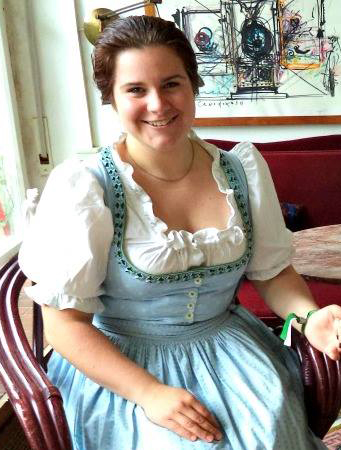By the time Michelle Malecha graduated with a degree in German from Minnesota State Mankato in 2013, she’d already studied in Germany twice and was going one more time.
Since then, she’s been teaching English in a country she’s adored since studying the German language in high school.
Malecha’s love for all things German started when she was still in high school, when she was able to stay in Germany as a foreign exchange student.

“(I love) the unique diversities that make Germany the country it is,” she said. “For example, historically, how young Germany is from a political viewpoint, and yet how old the country is from a cultural viewpoint. The great differences in dialect among every region of Germany never cease to amaze me.”
She decided to earn a degree at Minnesota State Mankato because she had already taken post-secondary courses here, making “great connections” with the professors in her major. The University’s German program had small class sizes and involved instructors, she said.
“The German program was very personal—on average, eight or nine students to a professor per class, which is ideal for language learning,” she said. “I loved the intimate setting and the personal connections we had with our professors. Nadja Krämer and Cecilia Pick left a lasting impression, not only on my language skills, but also on me. For anyone looking to expand their worldview and connections, I strongly recommend the German program.”
She has taught in German high schools, vocational colleges and community education centers, and she is currently working towards a master’s degree at a German university.
Malecha took the opportunity to really dive into her studies during her junior year, when she studied in Erlangen, Germany. There, she also ended up teaching French classes in Kosovo while on school break—one of many experiences she had abroad that she says shaped the person she is now.
“You will come back a more self-confident, improved version of you,” she said. “Studying abroad changes who you are and how you interact with the world.”
Through the University, Malecha also learned of the Hans Joohs Exchange Program, which connects New Ulm, Minnesota with its sister-city of Ulm, Germany. For three months, she stayed with a host family and worked at both teaching and translating German.
After graduating, Malecha took the plunge and moved to Germany permanently. She said she wanted to pursue her ongoing love of Germany and experience living there on a day-to-day basis for an extended period of time, not just a short study abroad program.
“I wanted to move over to Germany after studying in order to gain professional experience abroad after three and a half years of working toward my degree in German,” she said. “I saw moving abroad as an excellent opportunity to test myself personally and expose myself to new experiences outside of Minnesota, where I had lived for my entire life up until then.”
Malecha said stories like hers show that students can find unique ways to follow their passions and turn what they study into fulfilling careers.
“A liberal arts degree isn’t limited to someone who wants to move abroad; it will always be useful to anyone wishing to start a career connecting people, places and ideas,” she said. “The ‘lack’ of tangibility to the liberal arts is its strong point—it is flexible enough for you to bend it to meet whatever needs your future shows you.”
Speak Your Mind